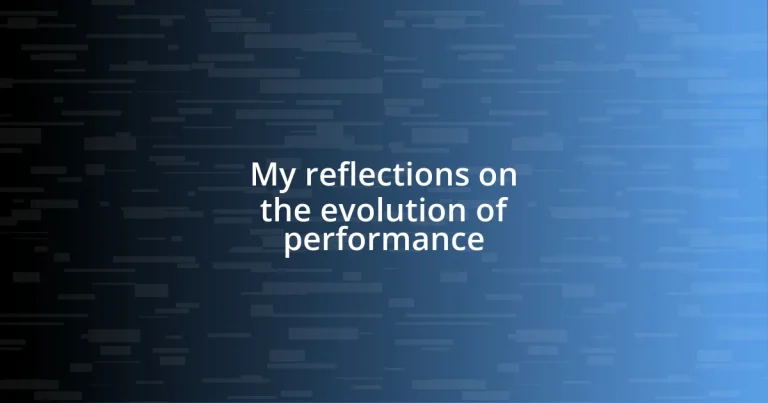Key takeaways:
- Mindset transformation and the acceptance of feedback are crucial for enhancing performance and fostering personal growth.
- Historical contexts, such as the origins of the Olympic Games, illustrate the evolving relationship between performance, culture, and identity.
- Future trends in performance management emphasize well-being, the use of technology like VR, and data analytics to create a more holistic approach to development.
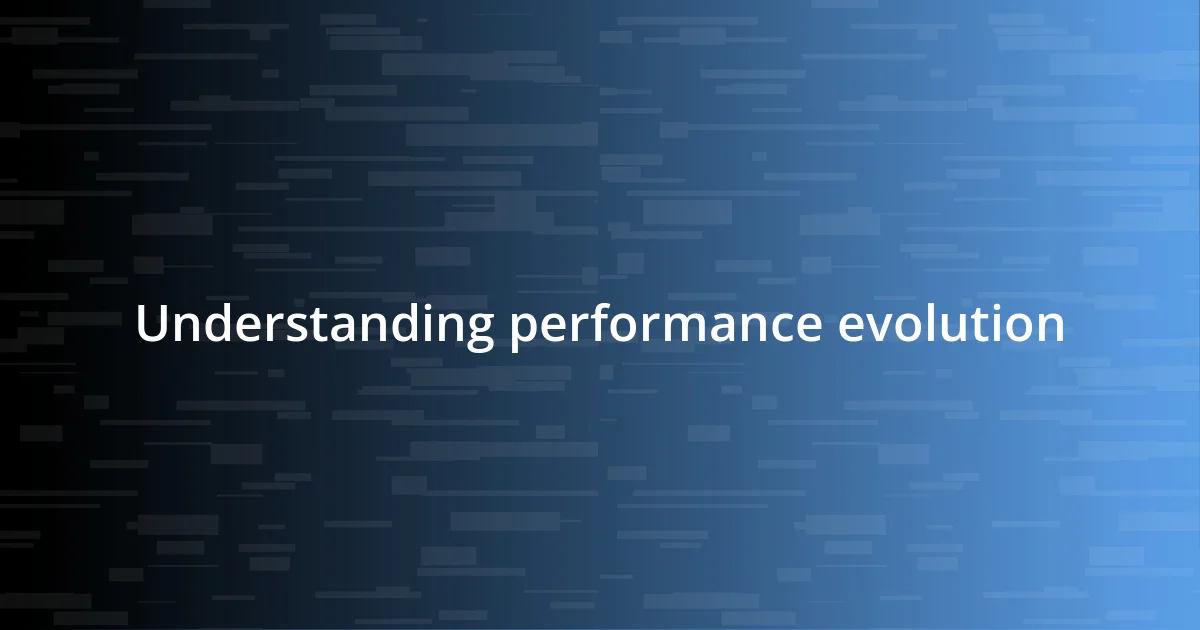
Understanding performance evolution
Performance evolution is a fascinating journey, reflecting not only the advancements in techniques but also a shift in mindset. I remember my first experience trying to improve my performance in a team setting; the change was not just about enhancing skills but also learning to trust and communicate effectively with those around me. It makes you wonder, how crucial is collaboration in the evolution of performance?
The evolution of performance often mirrors technological advancements, transforming how we assess and improve our abilities. I’ve witnessed this firsthand in my own career, where the introduction of analytics tools reshaped my approach to personal and team performance evaluation. Isn’t it intriguing to think about how these tools have changed the game, pushing us to achieve more than we ever thought possible?
At its core, understanding performance evolution requires us to reflect on our own experiences and the lessons they impart. I’ve frequently asked myself, what truly drives improvement—competition, personal goals, or the genuine desire to contribute? Embracing this complexity has enriched my perspective, revealing that personal growth is a critical component in the broader narrative of performance evolution.
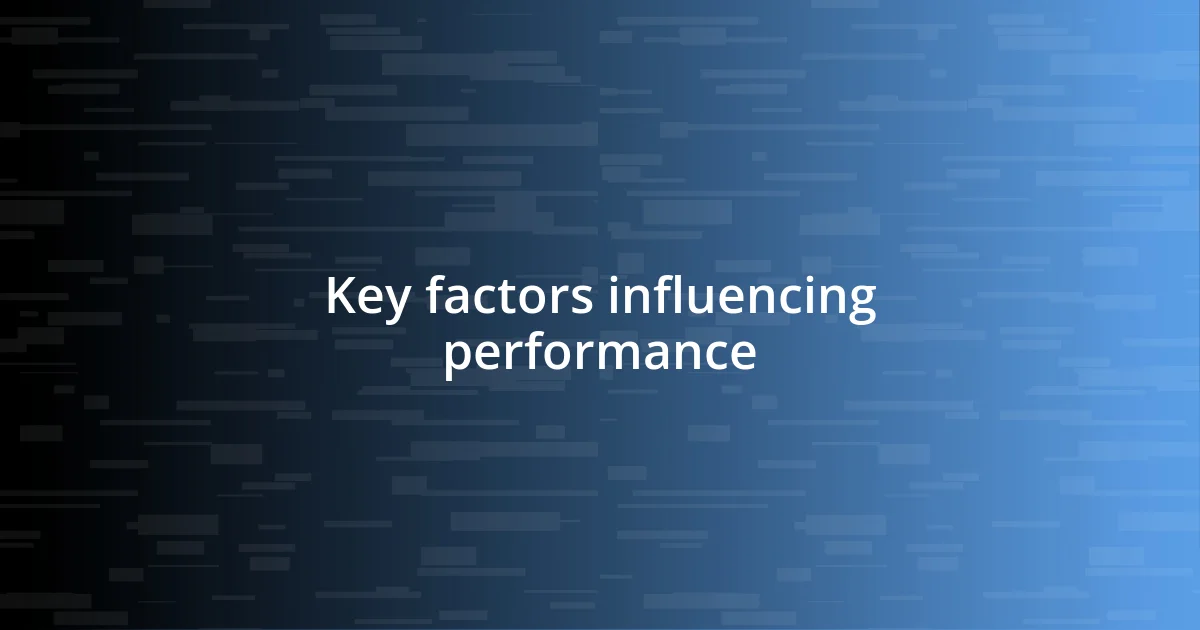
Key factors influencing performance
When it comes to performance, one of the most significant factors is mindset. I recall a time when I faced a particularly challenging project. Instead of feeling overwhelmed, I shifted my perspective to view the situation as an opportunity for growth. That change in mindset not only enhanced my performance, but it also inspired my teammates to adopt a more positive outlook. It’s fascinating how a simple mental shift can unleash potential.
Another key element that influences performance is feedback. Early in my career, I was hesitant to accept criticism, viewing it as a setback. However, I quickly learned that constructive feedback was a tool for improvement. The moment I embraced feedback, my performance soared. I began to actively seek it out, turning what I once viewed as uncomfortable into a valuable resource for growth. Can you remember a time when feedback changed your approach?
Finally, the impact of environment cannot be overstated. A supportive and motivating atmosphere can propel performance to new heights. I remember joining a team that celebrated small victories, creating an uplifting environment. This culture of encouragement not only boosted morale but also drove us to exceed our own expectations. How important do you think your surroundings are to your performance?
| Factor | Description |
|---|---|
| Mindset | A mental attitude that influences how we approach challenges and opportunities. |
| Feedback | Constructive criticism that fosters personal and professional growth. |
| Environment | The physical and emotional atmosphere surrounding an individual or team. |
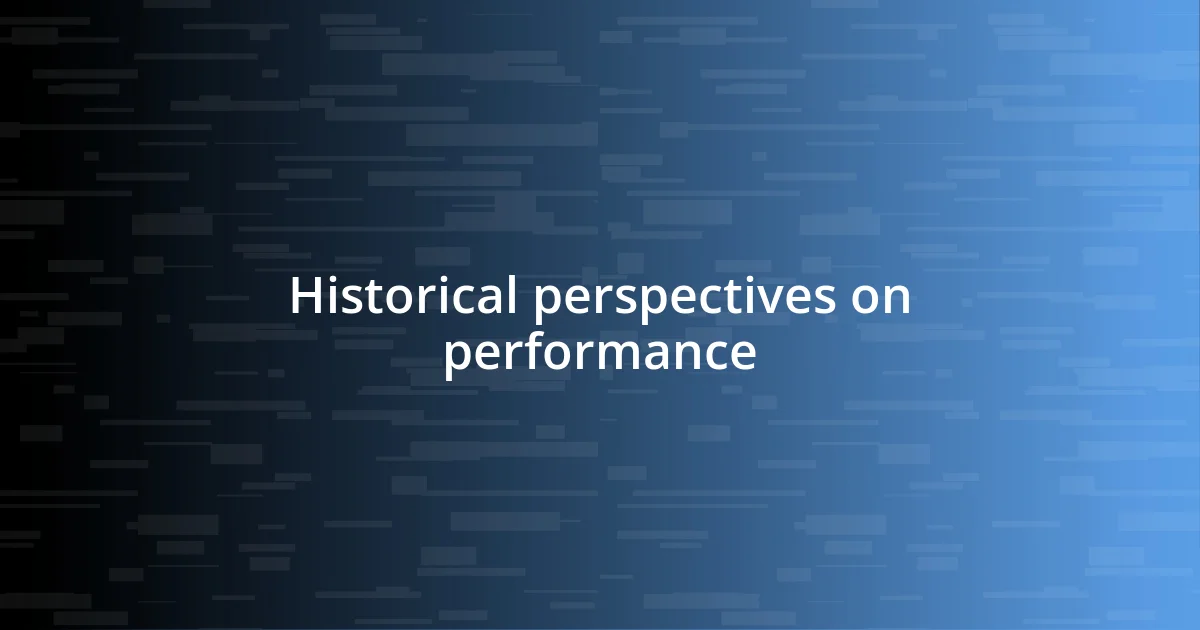
Historical perspectives on performance
The history of performance is deeply rooted in our human experience, marked by innovations that transformed how we strive for excellence. I often think back to ancient civilizations, where athletes competed in the original Olympic Games. These events weren’t just physical contests; they represented a cultural value placed on physical prowess, echoing the idea that performance is intertwined with identity and legacy. This connection between performance and broader societal values has always captivated me.
- In ancient Greece, performance was synonymous with honor and recognition.
- Medieval tournaments gave rise to the concept of chivalry and skill-based competitions.
- The Renaissance period heralded a new appreciation for art and creativity in performance, shifting focus from mere physicality to the expression of human emotion.
- The Industrial Revolution introduced structured training methods, emphasizing discipline and routine in performance enhancement.
Reflecting on these milestones, I realize that each represents a shift in how society perceives performance. The moments of glory in these historical contexts remind me of my own journey toward improvement. I can recall attending local competitions where the atmosphere was electric, filled with hopes and dreams, much like the historical events that laid the groundwork for performance as we understand it today. Such experiences highlight how performance evolves with cultural narratives, blending individual aspirations with collective identity.
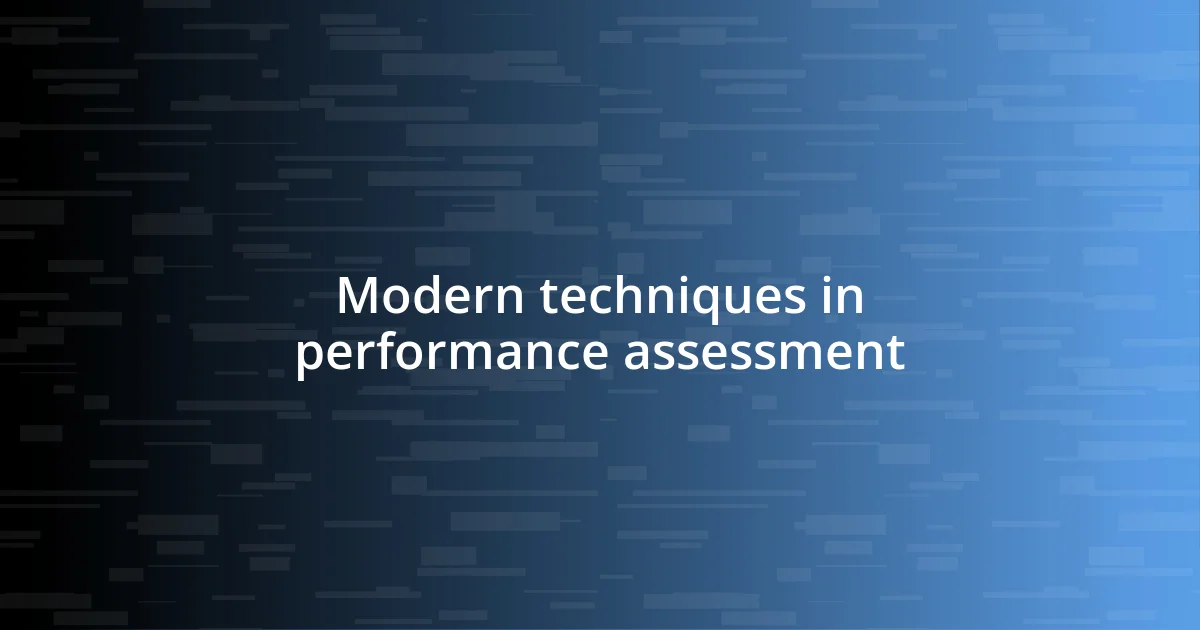
Modern techniques in performance assessment
Modern performance assessment has evolved dramatically, leveraging technology to provide real-time data and insights. For instance, the rise of wearable devices has allowed individuals to track their metrics, giving immediate feedback on their performance. I remember when I first used a fitness tracker; it transformed my approach to exercise. Suddenly, I wasn’t just working hard; I could see my progress and adjust my efforts based on accurate statistics. Have you ever noticed how much your engagement increases when you can visualize your achievements?
Additionally, artificial intelligence (AI) has begun to play a pivotal role in performance assessment across various fields. AI can analyze vast amounts of data, offering personalized insights tailored to individual needs. When I first encountered an AI-driven coaching platform, it felt like having a personal mentor available 24/7. The precision in identifying my strengths and areas for improvement was eye-opening. Could such technology reshape how we perceive our potential and development?
Peer evaluations and collaborative assessments are gaining traction.
These practices not only promote accountability but also foster a shared responsibility for performance outcomes. I’ve participated in several team-based evaluations, and I found that receiving feedback from my peers often provided perspectives I hadn’t considered. The humility and openness required for this process can be transformative. Have you ever experienced a moment where your peers saw something in you that you couldn’t? It’s in these exchanges that true understanding and growth often begin.
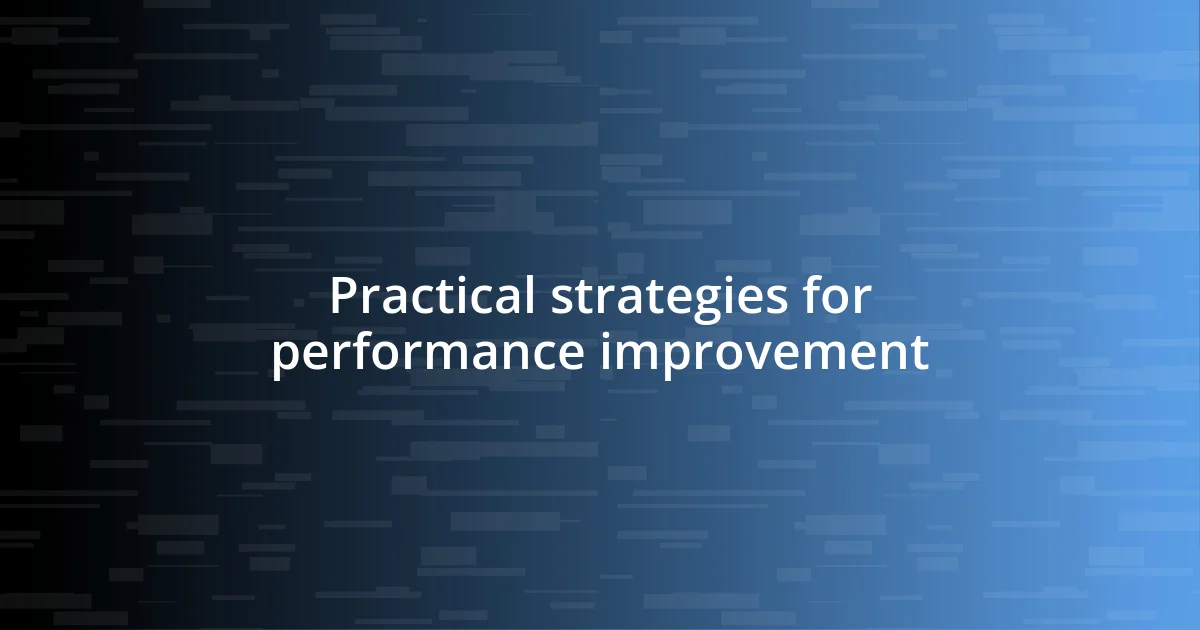
Practical strategies for performance improvement
When it comes to practical strategies for improving performance, I’ve found that setting clear and achievable goals is paramount. I remember the time I decided to train for a half marathon. Initially, the thought felt overwhelming, but breaking it down into smaller, manageable milestones made it less daunting and more motivating. Have you ever noticed how carving a larger challenge into bite-sized pieces can make a seemingly impossible task feel attainable?
Another effective strategy is the implementation of consistent feedback loops. In my experience, regular check-ins, whether through self-assessment or feedback from others, can illuminate blind spots. I once joined a coaching group where we exchanged performance updates weekly; it was incredible how those discussions sparked new ideas and renewed my enthusiasm. When was the last time someone offered you the insight to help you grow?
Finally, don’t underestimate the power of mindfulness and mental well-being in performance improvement. I used to overlook the mental aspect, thinking sheer effort would suffice. However, incorporating mindfulness practices, like meditation and visualization, transformed my mindset. I still recall the first time I visualized a successful presentation before actually delivering it — the clarity and confidence I felt were unmatched. Isn’t it fascinating how our mental state can dramatically influence our performance outcomes?

Future trends in performance management
The landscape of performance management is shifting toward a more holistic approach, with a strong emphasis on employee well-being and engagement. I’ve often felt that when employees feel valued and cared for, their productivity soars. Isn’t it interesting how much our environment impacts our drive? Organizations are increasingly recognizing that fostering a positive culture not only enhances performance but also reduces turnover.
As technology continues to evolve, we’re already seeing the integration of virtual and augmented reality for training and assessment purposes. I remember watching a demonstration of a VR program that simulated real-life challenges in my field. The immersive experience was not only exhilarating but also provided invaluable insights into my decision-making processes. How cool would it be to practice scenarios in a risk-free environment? This trend indicates a shift toward more experiential learning and immediate feedback, which can redefine how we approach performance development.
Moreover, data analytics is becoming a cornerstone in performance management. In the past, I’ve relied on intuition to gauge success, but incorporating data-driven metrics has been a game-changer for me. It allows for more precise adjustments and strategies. Have you ever wished for a crystal ball that tells you exactly where to improve? With advanced analytics, we can anticipate needs and tailor our growth paths more effectively, proving that numbers can indeed reflect our potential in ways we never imagined.












